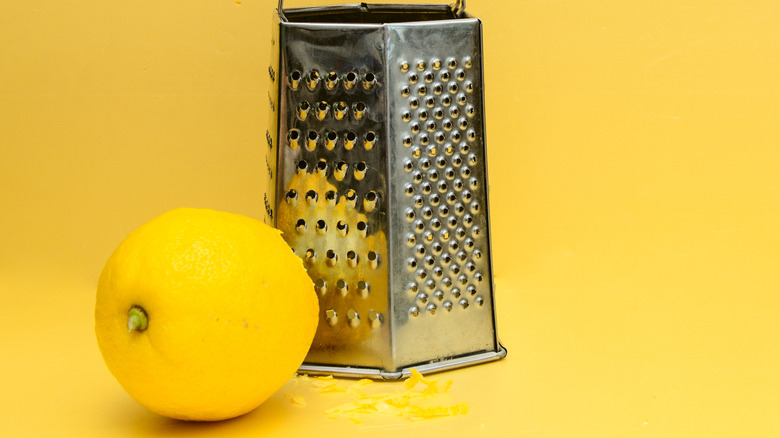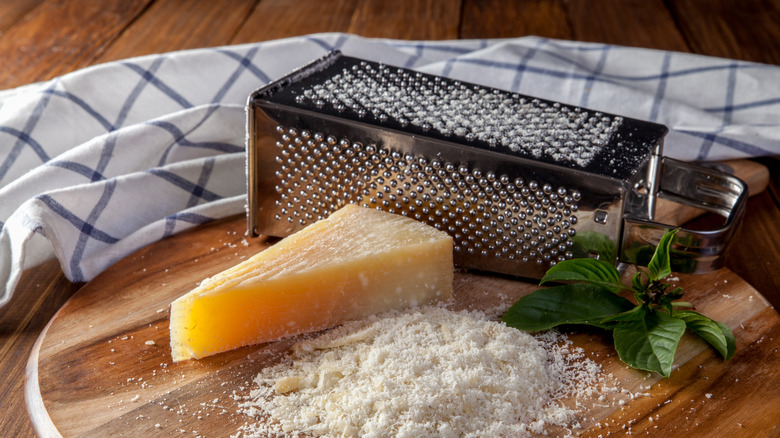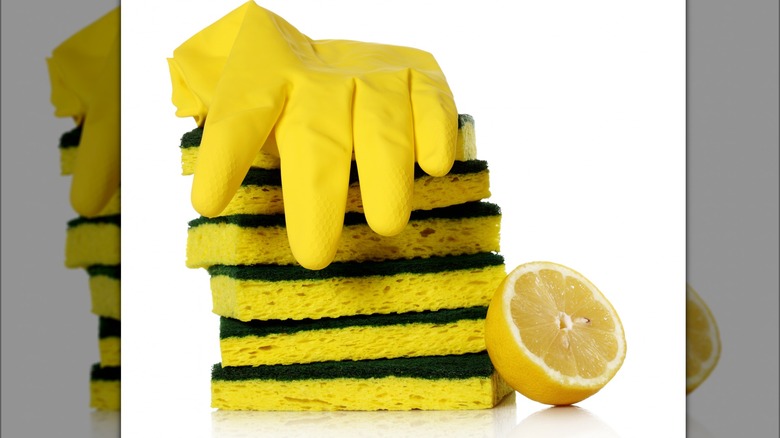Lemon Is The Secret To Cleaning Cheese Graters Without Shredding Sponges
Box graters are one of the best tools to have in the kitchen. Can you imagine attempting to shred cheese, grate garlic, or pulverize ginger root without one? But, alas, there is a catch to such convenience, and it's not necessarily your fingertip getting too close to the blades. While graters may un-complicate cooking prep, they can also be a hassle to clean. This is especially true when you use the side of the grater with the tiniest and sharpest blades, generally reserved to finely grate things like hard cheeses, chocolate, spices like nutmeg, and citrus zest.
If you have ever used your dish sponge to try and clean these tiny, sharp openings you know that the blades can shred your sponge as if the cleaning tool was made of butter. To avoid this, instead reach for a half of a used lemon squirted with a little dish soap and scrub away. As seen in a TikTok video, the lemon will shred too, but it will also clean any hidden gunk from the grater blades and the remnants of the lemon can be safely rinsed down the drain to the garbage disposal or added to your compost pile. It's a method that's easy, sustainable, and it smells great.
@problemsolved Easy way to clean graters #learnontiktok #tiktokpartner #cleantok
Easy, peasy, lemon-squeezy cleaning
Of course, you could always just place the grater in your dishwasher, which will do the dirty work for you, but for those without the appliance or, perhaps, if your recipe requires multiple grated ingredients, scrubbing it with a lemon in between is a great alternative. Lemon juice is highly acidic, and is naturally antibacterial, furthering its cleaning power.
For thorough cleaning, first rinse your grater with hot water to release any large particles of food that may be stuck on the blades. Take your used lemon half (if it's not used, squeeze the lemon juice and mix it with some salt for impressive staying power) and squeeze a drop of liquid dish soap on it, then scrub the grater until it's clean and sparkly.
If you find yourself out of lemons and still have a dirty cheese grater, all is not totally lost. If you must use a sponge, scrub the grater in the direction of the blades to avoid shredding. And on those lethal little blades, use a firm dish brush or even a new, designated toothbrush to get into those small, sharp openings.
Lemon is nature's freshest cleanser
The cleaning power of lemons and lemon juice certainly isn't limited to your dishes, either. There are dozens of ways the antibacterial citrus fruit can clean, freshen, and sanitize. One of the most well-known freshening uses for lemon in the kitchen is placing a few small pieces in the garbage disposal to neutralize the funky smells that can gather there. When the citrus is pulverized by the blades, the lemon oils will be released.
When you combine lemon juice and baking soda into a paste, you can also create a cleaning product that can spiffy up the inside of your oven, stainless steel appliances, tile and grout, and your sink. You can even use the cut side of the lemon as your sponge; just sprinkle the baking powder directly onto the lemon and scrub. Then use fresh lemon juice to clean and freshen those sponges that you've worked so hard not to shred (just submerge them in lemon juice and water for about 10 minutes, rinse, and squeeze out the excess liquid).
Clearly, it's worth keeping a few extra lemons in the kitchen to make cleaning up your cheese graters or anything else that much easier.



